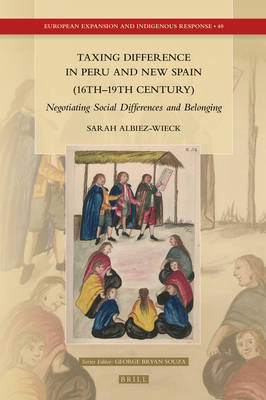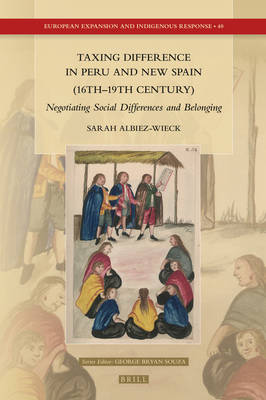
- Afhalen na 1 uur in een winkel met voorraad
- Gratis thuislevering in België vanaf € 30
- Ruim aanbod met 7 miljoen producten
- Afhalen na 1 uur in een winkel met voorraad
- Gratis thuislevering in België vanaf € 30
- Ruim aanbod met 7 miljoen producten
Zoeken
Taxing Difference in Peru and New Spain (16th-19th Century)
Negotiating Social Differences and Belonging
Sarah Albiez-Wieck
€ 236,95
+ 473 punten
Omschrijving
This book addresses the negotiation of categorizations in colonial societies in Spanish America from a new vantage point: fiscality. In early modern empires (poll) taxes were a significant factor to organize and perpetuate social inequalities. By this, fiscal categorizations had very concrete effects on the daily life of the categorized, on their assets and on their labor force. They intersected with social categorizations such as gender, profession, age and what many authors have termed race or ethnicity, but which is denominated here, more accurately with a term from the sources, calidad. They were imposed by legislation from above and contested via petitions from below, the latter being a type of source scarcely analyzed until now.
Specificaties
Betrokkenen
- Auteur(s):
- Uitgeverij:
Inhoud
- Aantal bladzijden:
- 400
- Taal:
- Engels
- Reeks:
- Reeksnummer:
- nr. 40
Eigenschappen
- Productcode (EAN):
- 9789004521636
- Verschijningsdatum:
- 22/09/2022
- Uitvoering:
- Hardcover
- Formaat:
- Genaaid
- Afmetingen:
- 155 mm x 235 mm
- Gewicht:
- 787 g

Alleen bij Standaard Boekhandel
+ 473 punten op je klantenkaart van Standaard Boekhandel
Beoordelingen
We publiceren alleen reviews die voldoen aan de voorwaarden voor reviews. Bekijk onze voorwaarden voor reviews.











